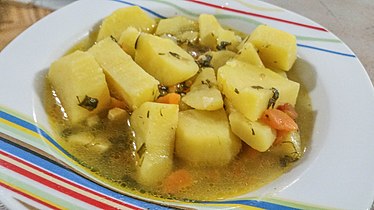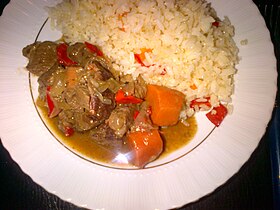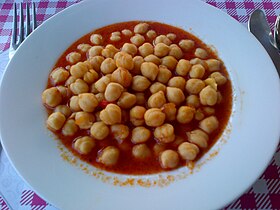Yahni
This article needs additional citations for verification. (March 2013) |
 Beef yahnia in North Macedonia | |
| Type | stock, broth, or soup |
|---|---|
Yahni, (Turkish[1]), yahniya (Bulgarian: яхния, Macedonian: јанија), or yakhni (Arabic: يخني, Urdu: یخنی, Hindi: यख़नी, Persian: یخنی, Greek: γιαχνί[2]) is a class of foods originating in Asia, found in many countries of southern Asia. It was later introduced to several countries in the Balkans.
In Pakistan and India, yakhni is simply stock or broth. It is often the base for many foods including pilaf (pulao) and other shorbas or soups.
In Bangladesh, akhni is a mixed rice dish and variant of the biryani and polao dishes.
In Arab, Greek, Palestinian, and Turkish cuisines, it is a stew of meat, fish, or vegetables in a browned-onion base with tomatoes and olive oil. In Bulgarian cuisine, sunflower oil is used instead of olive oil.
In Romanian cuisine, the term iahnie de fasole refers to a style of baked beans, often cooked or served with smoked meat and sausages.
Gallery
-
Plate of Greek food: yakhni at top center, with pork souvlaki below, mousaka (bottom left) and rice pilaf (bottom right)
-
Potato yahnia
-
Veal yahni served with rice
-
Turkish chickpea yahni
References
- ^ Alan Davidson (11 August 2014). The Oxford Companion to Food. Oxford University Press. pp. 117–. ISBN 978-0-19-967733-7.
- ^ http://www.greek-language.gr/greekLang/modern_greek/tools/lexica/triantafyllides/search.html?lq=%CE%B3%CE%B9%CE%B1%CF%87%CE%BD%CE%AF&dq=




